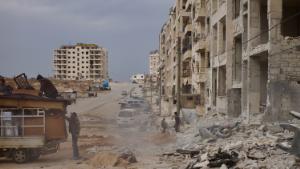Trump warns Syria, Russia, Iran against attack on rebel stronghold
President Donald Trump warned Syria and its allies Russia and Iran on Monday against attacking the last major rebel stronghold of Idlib province in the country's northwest.
"President Bashar al-Assad of Syria must not recklessly attack Idlib Province," Trump wrote on Twitter. "The Russians and Iranians would be making a grave humanitarian mistake to take part in this potential human tragedy. Hundreds of thousands of people could be killed. Don't let that happen!"
The President's warning comes just days after Secretary of State Mike Pompeo issued a similar warning to Russia's foreign minister, Sergey Lavrov, saying an attack on Idlib was something that Syria and Russia "agreed not to permit," and that the US "sees this as an escalation of an already dangerous conflict."
Trump and Pompeo's warnings come as US officials grow worried that an assault on Idlib could involve the use of chemical weapons if the rebels are able to slow regime advances.
Syrian President Bashar al-Assad's regime has moved armed helicopters closer to Idlib in recent weeks, according to two defense officials. The US is concerned they could eventually be used to launch another chemical attack as well as a conventional assault.
The day before Pompeo's warning, Lavrov told Western nations not to "play with fire" over Idlib and claimed the White Helmets, a group of unarmed volunteer rescue workers, were preparing to stage a chemical strike to blame on the Syrian government as a pretext for military action.
The Pentagon responded Friday, saying, "Russia has recently launched a concentrated disinformation campaign to discredit the United States and international partners and allies" and calling Lavrov's allegation about preparations for a staged chemical strike "absurd."
CNN reported Friday that US intelligence and military targeting experts have created a list of Syrian chemical weapons facilities that could be struck if Trump decided to order a new round of airstrikes in the country.
So far, a decision to take action has not been made, but one administration official with direct knowledge of the situation told CNN the military "could respond very quickly" if Syria launched a chemical weapons attack.
Iran's Foreign Minister Javad Zarif arrived in Damascus on Monday, and told reporters he hoped that events in Idlib went the same as operations in the past.
"We hope that the province of Idlib will be cleared of terrorism the same way as with previous operations of Syrian military, with the lowest casualties, such as the suburbs of Damascus and the southern provinces," Zarif said.
Earlier this year, weeks of violence displaced 320,000 people in the southern province of Daraa, after the Russian-backed Syrian military launched an offensive to recapture the town.
Eventually the rebels came to a reconciliation agreement with the Syrian government, in which the fighters agreed to hand over their weapons to the Syrian forces. Anyone who didn't want to be part of the agreement was said to have been allowed to transfer -- to Idlib.
About 6.2 million Syrians have been displaced since the conflict began in 2011, with a further 6.3 million having fled abroad as refugees, according to a recent UNHCR report.
News Courtesy: www.cnn.com











